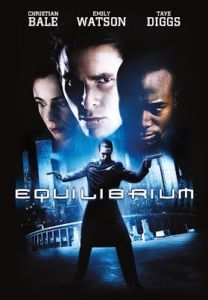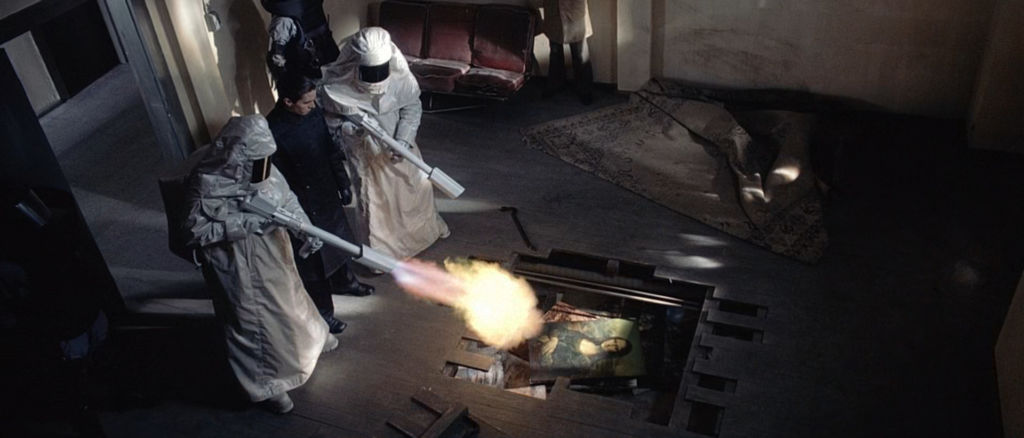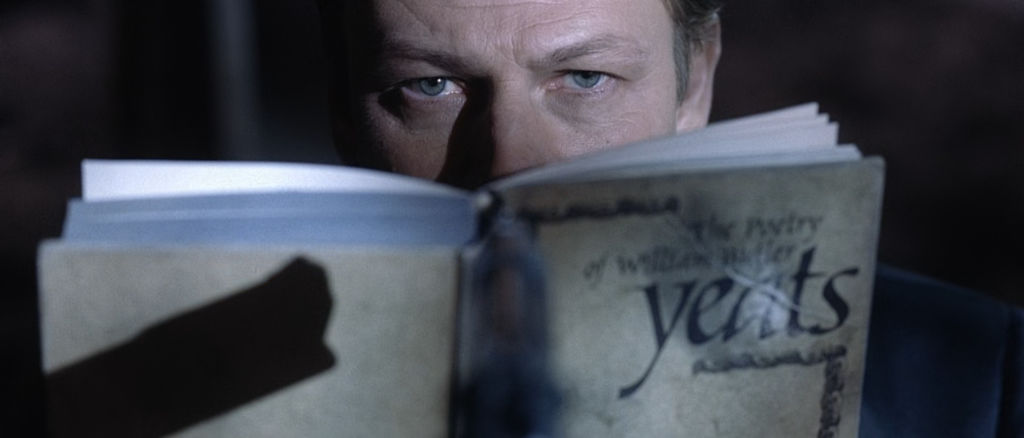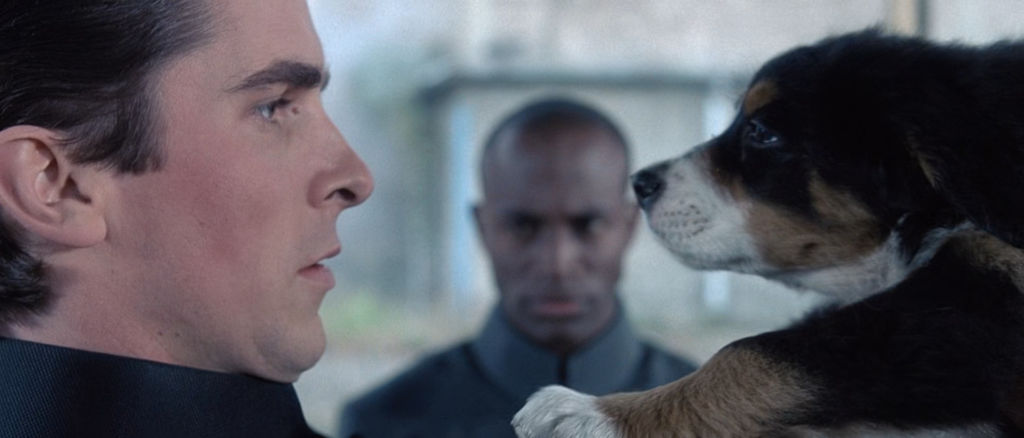Equilibrium
Posted By Buttercup Dew On In North American New Right | Comments DisabledEquilibrium is a 2002 science fiction film that was poorly received and underviewed, largely seen as an also-ran to 1999’s The Matrix, which set the tone and style of cyberpunk thrillers to follow. Equilibrium is unjustly forgotten, a sleeper non-hit that deserves revisiting; a thoughtful and condensed statement on huge volumes of preceding dystopian literature and cinema.
Equilibrium plays to the strength of film as a medium in its ability to succinctly put salient points into character narratives that otherwise require full-length novels and academic treatises. Unlike The Matrix’s distinct interplay of a drab, anonymous “real world” and a grimy, machine-dominated nightmare, Equilibrium’s budget sets and sterile city are a throwback to classic science fiction, a cobbled together B-movie with more to say than it has the brain to articulate. It speaks directly to the literature and nightmares of contemporary liberals and the metaphysical propositions of modern-day fascists alike.
The film begins with a monologue exposition on how a third world war has driven mankind (supposedly) to the brink of extinction, and that the powers-that-be have deemed it vitally necessary to avoid a fourth. War is understood as an unpleasant but sometimes necessary price to pay in most societies, but in Equilibrium’s world, the third world war is blamed on an excess of human emotion rather than specific political actions. This tidy rationalization is used by the state to justify keeping the populace in a dumbed-down, emotionless, lethargic torpor.
 [2]
[2]You can buy Buttercup Dew’s My Nationalist Pony here [3]
At first glance, Equilibrium might appear to young Rightists as a DVD-rental critique of Eastern Bloc Communism in a Brave New World-style hyperfuture; a Christian Bale-infused, stern send-up of the excesses of collectivism and egalitarian equality — hence the title. But one would be wrong. The moniker “Equilibrium” in fact refers to the ideal of keeping everyone in a state of emotional nullity, a balancing (flattening) of the anarchic sways and tides of individual emotion via a routinely-injected anesthetic, “Prozium” (Prozac?).
Feelings are forbidden, as an excess of feelings could lead to a further cataclysmic outbreak of war. Typical justifications of war such as resource scarcity or identitarian concerns are completely glossed over, as Equilibrium (or Librium, as it was originally called, referring to the hypothetical city-state it depicts) is instead an existential critique of fascism that nonetheless celebrates fascistic impulses. The idea of feelings being criminalized leads to outrageous, laugh-out-loud funny lines where the straight-faced deliveries and total seriousness of the plot and message can’t overcome the hyperbolic premise: “I’m not the one who’s feeling. He’s the one who’s feeling! He’s insane!” Character motivations are contradictory and nonsensical from the outset: Equilibria is described as a “great society” in gushing, emotional oratory justifying the banishment of emotions and the state-imposed death penalties for expressing them. The lead antagonists’ motivations are all career-related, for example — something that doesn’t make sense in a world without feelings.
Everyone in Equilibria seems not to live in a state of perpetual non-feeling, as is suggested by the drug, but rather in that of repressed feelings — repressing emotion and extreme asceticism is described as being “without emotion.” One feels only what is ideologically compliant; to have feelings outside of what is state-approved or according to the party line is a criminal offense, inherently reactionary and counter-system. This is a gambit borrowed from 1984 and Brazil. The concept of mandatory, emotionally-stunting drugs was popularized by Brave New World and transmitted to the big and small screens by THX 1138 and Blake’s 7, respectively. What’s interesting is that Equilibrium takes the approach of creating its own form of Newspeak, describing those who refuse to take Prozium and seek out — or allow themselves to experience and act according to emotion — as “sense offenders,” which is used to describe anything ranging from someone being annoyed at work to “having relations with a female”:
You’re rearranging your desk?
I have no feelings about it. I’m optimizing.
Equilibrium’s critique of fascism, and specifically religiously-motivated fascism, is that it is a negative state of society which prides itself on asceticism and repression in and of itself, without any meaningful goal. Just like Christianity is forever looking backwards to a speaker and rabble-rouser from the past and forward only to a revelation brought about by emotional abstinence, repression, and ideological compliance, Equilibrium’s hypothetical society is predicated on a negative: Avoiding the apocalyptic “sin” of feeling. Wimmer, the director, correctly identifies within National Socialist aesthetics and aspirations an identical current of ideological compliance and point of pride: the totemic obsession with “order,” with being in compliance with “order,” and with order in, of, and for itself — and for no other purpose.
A female lead counter-questions Preston (Christian Bale), a “Grammaton Cleric” (after the Tetragrammaton, a symbol also used as Equilibria’s flag) designated with expunging art, literature, and dissidents from society: “Why do you live?” A fascistic order grounded solely on the ideal of self-perpetuity is ultimately hollow because it is self-referential: To say that the purpose of life is to create more life, or that the purpose of the order is to preserve the order, is to kick the can down the road and pass the buck, passing the existential question forward a generation rather than inwardly and introspectively making a value choice. One can, of course, choose to believe that creating children so that they can also experience life is a worthy investment of one’s life, but more often than not, self-perpetuity is held as an inviolable ideal to cover inner vacuity. It reveals the falsity of totalitarian “necessity”: Without room for a large degree of personal autonomy, and without enough freedom, there is no point in preserving the social order, because the point of life is simply to live.
This basic existential question is something that Equilibrium’s main characters struggle with. At one point a resistance member comments that some people have to repress their emotions so that others can have the luxury of enjoying them — some people must at times sacrifice themselves to preserve their societies — something so elementary and fundamental to life that it’s like listening to a parent explain to a child about why people have teeth. William Fichtner’s observation upon seeing Preston’s expression of shock is unbeatably funny: “You’re feeling.” Ethnonationalism, White Nationalism, American nationalism, and other currents founded on the idea of self-perpetuity similarly need to be very careful not to become overtly cultish, freakish, or closeted. This is because they are trends predicated on a negative — avoiding demographic decay, collapse, and eventual extinction — to the extent that those who adhere to these movements often believe that simply living in itself is oppositional — something dissident, “degenerate,” and twisted. It then becomes a social necessity to stamp this feeling out and replace it with asceticism, and celebrate only the virile, expansionist, ultra-masculine, and confrontational to the exclusion of all other tastes, and define this as the only “natural” and permissible taste.
Hence the marriage of overt National Socialism, White Nationalist elements with Christian nationalism. These uneasy bedfellows are bound by the belief that some things are inherently and unforgivably just wrong based on precepts of natural law and totemic ideals and lifestyles. This sort of extreme emotional repression is satirized in Equilibrium to the point of absurdity, where Grammaton Clerics and armed police cannot fathom why resistance members kept pet dogs in a dog pound in the “Nethers,” the world outside the city-state’s safety and insularity. Like the “rational” city of Zamyatin’s We, it is unclear whether the totalitarian system is world-encompassing or is only a very small, self-isolated entity. They set about culling the dogs for being a nuisance, and Christian Bale is caught between doing his duty to put a bullet between the eyes of the cutest puppy the director could find and coming up with an excuse to take it away from the jackboots. The scene of Preston having an existential crisis as he stares into the dog’s eyes is hilarious. You see, dogs just aren’t necessary. And this comes after a silly scene of him executing a man for reading a book.
Equilibrium’s critique of repressive religiosity, and more broadly of totalitarian ideological fervor in general, is not merely that these things can become coldly injurious or insane. It’s that this religiosity is a frivolous form of extreme vanity. The eventual twist reveals on a deeper level that the Clerisy, the aristocratic warriors who are constantly on the lookout to keep the hoi polloi in a constant state of obedient emotional checkmate, are themselves just playing a violent game of pure power in relation to who gets to be in charge. It embellishes the fact that the state ideology is not discovered wisdom or philosophical statecraft, but a fiction the Party uses to shroud itself in mystery. The will of the state is clandestine, clerical, and hermeneutic; vandalism and murder is dealt with euphemistically and is disguised as routine policing: “What is it we do, then?” All other things having been excluded as heretical, the pursuit and exercise of power is the only thing that the society can be said to be about: hence, totalitarianism and purity of thought and deed.
Equilibrium’s drab aesthetic borrows from They Live. Its color palette only improves in the Clerics’ martial arts school, when the film takes on a slightly warmer gold tint. The viewer is treated to an exposition about the “gun-fu” used to make the Clerics nigh invincible: To prevent themselves from being shot, they position themselves strategically between their opponents so that their foes will be reluctant to shoot at them for fear of hitting an ally. They then practice gun movements ritually so that they have the advantage conferred by practiced ease. When Preston moves in for the final showdown, he is dressed in ceremonial white and gold: colors of purity and royal wealth, something out of place in a society that uniformly wears blue or black work overalls.
Preston, the best Cleric the system was able to produce and a supreme example of human refinement, eventually triumphs over adversity and destroys the totalitarian state and its inhuman system of emotional repression — but he manages to do so only because of his ability to repress and control his emotions. Without his tenacity, hardness, and ability to be both detached and calculating, all would be lost and Equilibria would remain a bland, suffocating, and ultimately boring society that wastes its inhabitants’ time and lives by being afraid to feel and fearful of those who do. In this, Equilibrium offers a critique of the fascist society while making the case for heroism underpinned by fascistic methods and aristocratic values: It returns them to their proper framework and scales back their excess, condemning the ridiculousness and egotism of those who take these values to be absolute.
* * *
Counter-Currents has extended special privileges to those who donate $120 or more per year.
- First, donor comments will appear immediately instead of waiting in a moderation queue. (People who abuse this privilege will lose it.)
- Second, donors will have immediate access to all Counter-Currents posts. Non-donors will find that one post a day, five posts a week will be behind a “Paywall” and will be available to the general public after 30 days.
- Third, Paywall members have the ability to edit their comments.
- Fourth, Paywall members can “commission” a yearly article from Counter-Currents. Just send a question that you’d like to have discussed to [email protected] [7]. (Obviously, the topics must be suitable to Counter-Currents and its broader project, as well as the interests and expertise of our writers.)
To get full access to all content behind the paywall, sign up here:
Paywall Gift Subscriptions
 [8]If you are already behind the paywall and want to share the benefits, Counter-Currents also offers paywall gift subscriptions. We need just five things from you:
[8]If you are already behind the paywall and want to share the benefits, Counter-Currents also offers paywall gift subscriptions. We need just five things from you:
- your payment
- the recipient’s name
- the recipient’s email address
- your name
- your email address
To register, just fill out this form and we will walk you through the payment and registration process. There are a number of different payment options.



